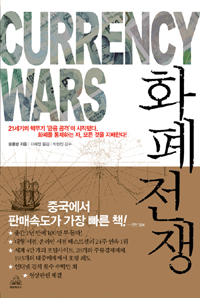
In my life in financial markets, this is perhaps one of the worst books I have ever read. The fact that it was so popular in Korea is embarrassing to me as a Korean. Koreans read this book, and asked me about the theories in this book. I found it very difficult to answer without laughing. On the other hand, the author needs to be congratulated for being able to sell this piece of junk as if it were fact, and was able to get so many people to believe the ideas in this book.
"Currency Wars" is a very fancy name, and the title has implications of conspiracy and collusion. Now, let me make some thing perfectly clear. There is almost no doubt that the central banks of nations, at times, do work collectively together in order to try to affect the relative value of currencies. At times, individual central banks try to affect the foreign exchange rate of its own currency. Over the past 3 months, the Swiss, the Japanese, and yes, the Korean central bank have all acted in the foreign exchange markets to attempt to affect the value of its currency. In each of the recent cases, central banks have tried to devalue its own currency, i.e. make its own currency cheaper, so that the products made by companies in that country are relatively cheap on the international market. You can read my post here to illustrate how Korea has benefitted greatly by the Japanese Yen appreciation in the foreign exchange markets:
http://seoulgyopoguide.blogspot.com/2010/09/koreas-reason-for-feasting-this-year.html
However, the idea that a group of people is trying to systematically harm another country in order to preserve some type of global order is wrong. The ebb and flow of foreign exchange, and the resulting trade imbalances would prevent this. If Japan's foreign exchange rate was this strong and Japanese companies experienced large losses and layoffs, then wages would decline, would make Japanese products cheaper in the marketplace, and so on. In other words, it would be impossible to permanently conspire in order to keep some type of global order. In the end, quality of products, technology, access to resources, and other fundamental economic drivers will not be denied.
The idea of 회폐전쟹 is that there is a fundamental problem with governments printing paper money. The fact is that printing money, and controlling the money supply is the only policy tool that can smooth out economic imbalances and inflation. There are many levels of debate regarding the level of the amount of money being printed. For example, the United States and Europe are, via the phrase "Quantitative Easing" are buying assets, like bonds and stocks, with paper money in order to increase the amount of money in the market. There is the Korean phrase "돈 돌라 벗다," or something similar. Well, that is the concept here. The US and European central banks have purchased their own bonds in order to increase the amount of money going around, so that prices of assets will increase. The negative side of this is that if this amount of money grows too quickly, then inflation will occur.
Do you know why I am particularly annoyed by this book? I am most annoyed that this book was so popular in Korea. It is factually wrong, and it suggested fantasies of conspiracy. This is a fundamental problem of Korea, even now. Due to its history of one leader, and a militaristic background, there is an overbearing suspicion of authority. In the rest of the world, however, there is the idea that money moves freely, and from the places that can generate profits, and away from the places that will generate losses, without regard to borders, the name of the country, or the ethnic background of the people. Korean society, in general, does not embrace the belief in the concept of shareholders' rights. This is changing, gradually. But the attitude that the dictator is dominant, and is successful, has not. Korea needs to embrace the idea that capital can and should move freely. Consumers will choose the best products at the best prices. That will affect the foreign exchange rates. The pace of that change will increase as the pace of change in the increases. In the 1950s, Korea was one of the poorest countries in the world. Now, it is a fact that Korea is one of the richest. It has products that are globally competitive in many of the most important industries in the world. It must fully embrace not only the practices of the global community, but it must not be paranoid of conspiracy theories like the ones in 회폐전쟹. Blaming conspiracies is a flaw of the weak, and Korea is weak no longer.
0 comments:
Post a Comment